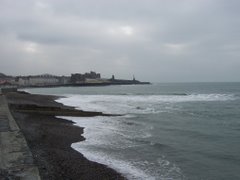Today, Guardian Unlimited featured an article by Steve Boggan about the new passports the UK government has issued. These passports were created to satisfy US concerns that British passports are both secure and more difficult to copy than in the past. (The 9/11 terrorists used fake passports).
After reading the article, it became clear to me that the new passports are a waste of money, and make Britons more vulnerable.
These new passports contain Radio Frequency Identification (RFID) chips, which means they can be read by an RFID-reader, without anybody having to physically open them up. The information is passed from the chip to the reader over radio signals.
Apparently, Steve was able to work with a computer expert to crack the passports, and read all the information contained within them. This was done over a period of only 48 hours with the purchase of a £250 RFID-reading machine, and knowledge of encryption software.
Now, it will now only take seconds for the duo to read any new-style passport in this way.
RFID chips are now all over the place, despite the fact it is a fairly new technology. Having worked for a packaging-related business publication, I know that RFID is a rapidly expanding technology. The chips are already used for stock control in warehouses -- the chips, which contain information about the products they are stuck to, are scanned with hand-held RFID readers. Warehouse operators can then extract important information from the chips, such as where the products have come from and where they are destined to go.
RFID tags are even attached to individual items in retail stores that customers then take home. These uses do not really concern me. Used for inventory control, I think RFID chips are harmless.
But there is now talk of retail stores having RFID readers which will read the items that you have in your cart as you pass them, and then, through a screen, suggest some things that you could buy to accompany your purchases. For example, if you’ve bought a couple of salmon steaks, the RFID reader will recognise the salmon code in the RFID chip and it might recommend you purchase a certain variety of Pinot Gris to go with them.
This is exciting news for marketing executives, but scary news for those of us who don’t like the idea of stores keeping track of our purchases. I usually don’t use, or sign up to, store cards for this exact reason. But now that passports have RFID, marketing executives in retail are the least of our worries.
RFID can now track people. It sounds like science fiction, but it’s happening. Machines will now know where you are in the world and where you’ve been.
And unscrupulous people and criminals can theoretically steal information from you by reading your RFID passport while they sit next to you on the bus. Once they have your basic information, like your name, address, height, weight, date of birth, nationality and passport number, they will find it very easy to steal your identity and use it without your knowledge.
What’s more, your RFID passport chip can be cloned, and a fake version of your passport can be fairly easily made up. So now you don’t even have to lose your passport to become a victim of passport theft.
What governments seem to be unable to grasp is that security technology will only ever be effective for a couple of months, so there is no point in investing millions in it. Using RFID as a security measure has actually made Britons, and any other citizens whose countries decide to use RFID, more vulnerable. And once the government works out how to incorporate biometric information into a passport, I doubt the passport will be more secure. Criminals (and Guardian journalists) will have that cracked soon enough. There will simply be more information to steal.
What’s really needed is better-trained staff at check-in points at airports, and clear rules on who is allowed to travel and who is not. That is the only way to keep terrorists out of the countries where they want to create havoc.
Friday, November 17, 2006
Subscribe to:
Posts (Atom)
